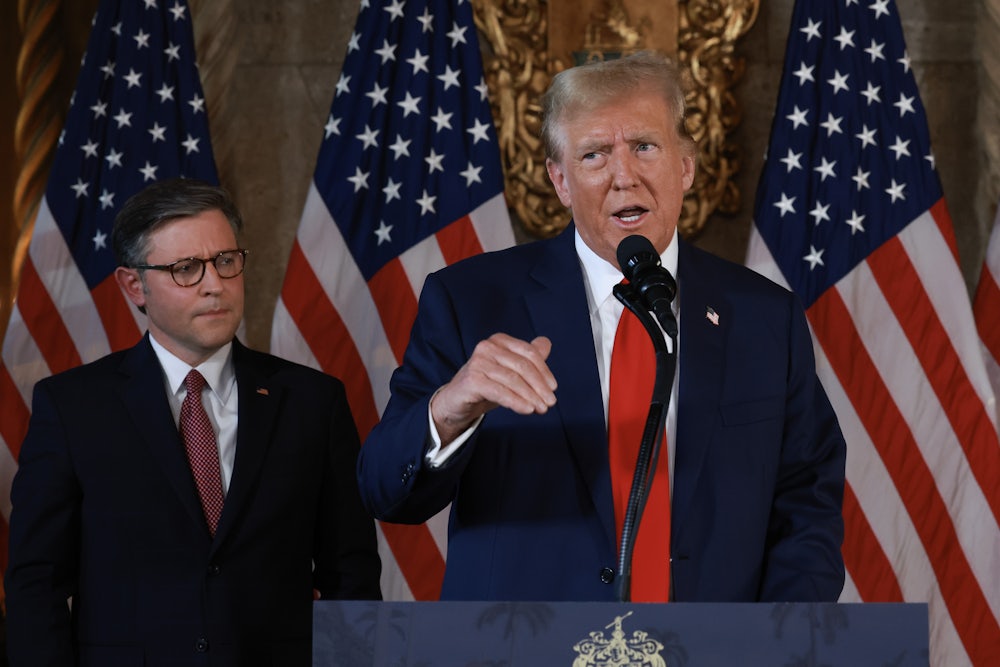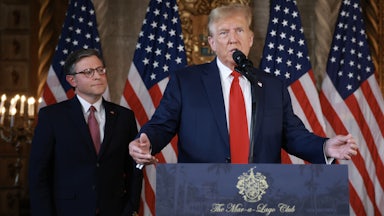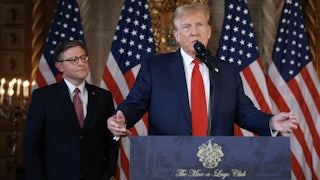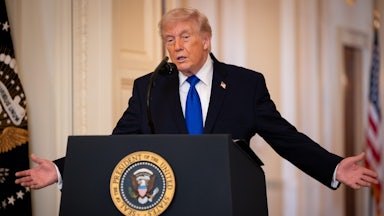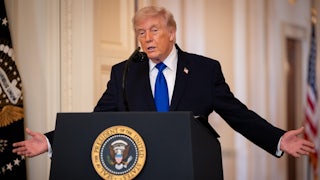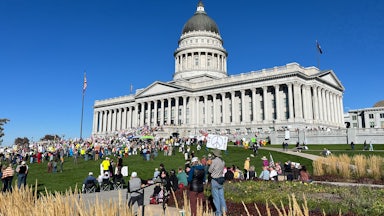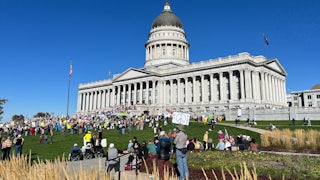Former President Donald Trump’s rally at Madison Square Garden in New York City received a lot of attention for its racist comments. Another comment that quietly stood out came from Trump himself. At one point while on stage, Trump turned to Speaker Mike Johnson, who was in attendance.
“I think with our little secret we’re going to do really well with the House, right?” he said, with an air of slyness to himself. “Our little secret is having a big impact. He and I have a little secret—we will tell you what it is when the race is over.” Johnson stirred the pot the following day by confirming some sort of clandestine understanding between the two men. “By definition, a secret is not to be shared—and I don’t intend to share this one,” he said in a statement.
It is unclear what exactly this “little secret” involving Trump, the speaker of the House, and the postelection period might be. But it is hard to not fear the worst where Trump is concerned (his tendency to say the words “little secret” out loud repeatedly notwithstanding).
To start with, it’s worth revisiting how presidential elections work. For most of living memory, the winner was apparent on election night, the losing candidate would concede, and the counting of the electoral votes was a mere formality. Trump’s refusal to accept his losses made each of those postelection checkpoints significantly more important—and more fraught.
After releasing the preliminary totals on and after election night, state election officials will certify the results. That certification deadline varies from state to state, but the earliest ones are in late November and the last one is on December 6. Electors then formally cast their votes at the 50 state legislatures later in December. Those votes are then transmitted to Congress, which counts them on January 6, 2025.
There are a few points of good news about this process. First, election-denialist Republicans do not control the election machinery in the key battleground states. Democratic secretaries of state will oversee the elections in Arizona, Michigan, and Nevada. In Georgia and Pennsylvania, the Republican secretaries of state both previously rejected Trump’s efforts to subvert the results in 2020. Democratic appointees hold the majority on North Carolina’s state elections board, and Wisconsin’s board is nonpartisan.
There are some localities where election denialists hold key positions, such as Washoe County in Nevada. Those pro-Trump figures may try to block or delay the results in the days and weeks after Election Day. Generally speaking, however, they will not be able to definitively block lawfully cast ballots from being counted. In many states, their role is simply ministerial, meaning that they don’t exercise any real discretion over the outcome.
Second, Congress took steps after the last presidential election to update the rules for the 2024 contest. Lawmakers from both parties passed the Electoral Count Reform Act in 2022 to amend the 1887 law that had previously governed the process. One key change is clarifying who can officially submit documents to Congress that identify the state’s slate of elections—the state’s governor by default unless another official is chosen by state law—to eliminate “alternative” slates like the ones floated by Trump’s allies in 2020.
The new law also clarified key aspects of the joint session of Congress where electoral votes are tabulated. It bars vice presidents from unilaterally rejecting electors, as Trump pressured Pence to do in 2020. Nor can lawmakers challenge the slates of electors so easily. It now takes at least 20 percent of a chamber’s lawmakers to raise a challenge, and they can only do so in extremely limited circumstances.
Third, Donald Trump is not the sitting president of the United States. In 2020, Trump took no steps to disperse the mob that he had encouraged when it attacked the Capitol and only publicly called for them to leave many hours later. This time, a more forceful coup attempt during the electoral count would be impossible since neither the U.S. military nor federal law enforcement is at his command.
So what are the remaining weaknesses in the system for Trump to attack? There is only one constitutional method that could reverse a Harris victory. The Twelfth Amendment spells out the procedures used to certify and count the electoral votes. It also includes an alternative method to choose the president and vice president if no candidate receives a majority of electoral votes in the Electoral College.
“If no person have such majority, then from the persons having the highest numbers not exceeding three on the list of those voted for as President, the House of Representatives shall choose immediately, by ballot, the President,” the amendment states. “But in choosing the President, the votes shall be taken by states, the representation from each state having one vote; a quorum for this purpose shall consist of a member or members from two-thirds of the states, and a majority of all the states shall be necessary to a choice.”
This process is known as a contingent election. It is extraordinary in that it requires the 435 House members to vote by state rather than as individual members. California’s delegation, for example, has 52 members. But that delegation would only cast a single vote for president. If the current House of Representatives voted to elect a new president, Donald Trump would almost certainly win because Republicans control more state delegations than Democrats at the moment.
This would be an unusual set of circumstances, to say the least. The House has only held one contingent election in the republic’s history under the Twelfth Amendment. In 1824, four candidates won electoral votes and none of them received a majority. Andrew Jackson had captured a plurality of popular votes and electoral votes, but the House elected John Quincy Adams instead. Perceptions of a “corrupt bargain” to secure Adams’s victory helped Jackson win the 1828 presidential election outright.
That brings us back to Trump, Johnson, and their “little secret.” Can the former president and the speaker force a contingent election? Thanks to the revised Electoral Count Act, there is no clear pathway for Republican lawmakers to throw out lawful, legitimate electoral votes. (It’s worth noting that Harris herself would preside over the joint session where this takes place.) In theory, a contingent election would be also held if Trump and Harris tie with 269 electoral votes each. But this isn’t a secret plan hatched by Johnson and Trump; it’s a well-known feature/bug of the Electoral College.
The last possibility I can think of involves some sort of attempt to stop the January 6 count from happening at all. Outside of using force, there doesn’t appear to be a clear way to do that. As previously noted, it would be Harris, not Johnson, who presides over the count. And the Twelfth Amendment imposes no quorum requirements for the joint session, so Republicans could not stop it simply by not showing up.
Finally, there’s an additional failsafe in this process. If neither the Electoral College nor the House elects a president or vice president for some reason by January 20, then the next person in the presidential line of succession becomes acting president until one or both positions are filled. Under the Presidential Succession Act of 1947, the next person in line would be the speaker of the House. But it’s worth noting here that the new Congress will be sworn in on January 3, so there’s an outside chance that Johnson might not even be speaker then.
In short, I am not sure what Trump and Johnson’s “little secret” after the election could be. If it is about subverting the election results if Harris wins, then there is almost nothing that the two men could do on their own to block her from the presidency. Then again, in 2020, nobody thought that the vice president could unilaterally throw out electoral votes before disgraced legal scholar John Eastman brought his caper to Trump. If Trump and Johnson are planning something along those lines, it does not exist within the four corners of the Constitution.
